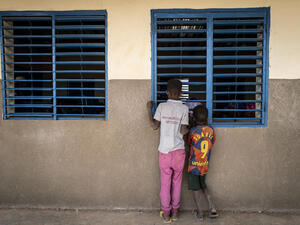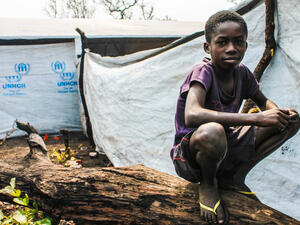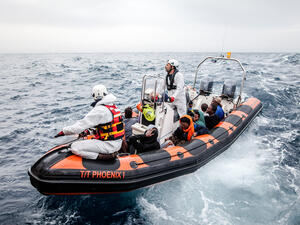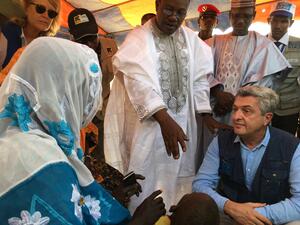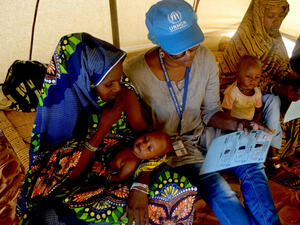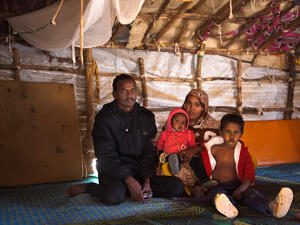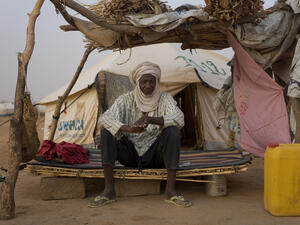Broom-wielding refugee sweeps away the cobwebs in Burkina Faso camp
Broom-wielding refugee sweeps away the cobwebs in Burkina Faso camp
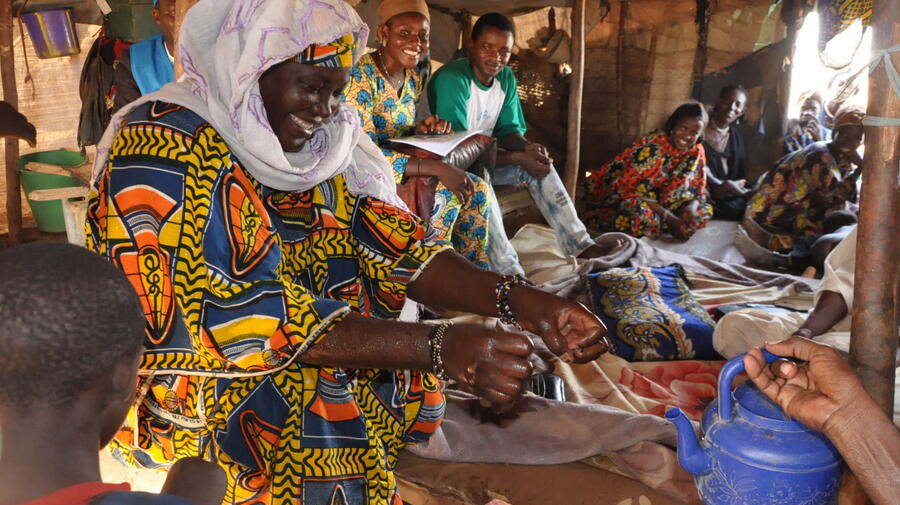
Roky explains to other refugees the importance of cleanliness, including washing one's hands before meals.
GOUDOUBO CAMP, Burkina Faso, December 31 (UNHCR) - Roky is someone who takes pride in keeping a clean home and she's not letting standards slip in exile, even though she has a lot to worry about.
Her most important possession is a broom that she made from shrubs collected near her home in the arid Sahel region of northern Mali. Roky brought it with her when she fled to Burkina Faso in April last year after armed men attacked her village during the Malian conflict. It has helped to transform her life as a refugee, and empower her as a woman in a patriarchal and hierarchical society.
Although Roky escaped with her five children and a sister, some of her relatives were killed. "We fled on two donkeys, leaving loved ones behind. It was very painful and frightening," she recalled.
The family stayed first at Fererio camp before being moved to the safer Goudoubo Refugee Camp in mid-October. The 35-year-old Roky was at that time still traumatized by the attack, the shock of flight and the loss of kin. "I was a prisoner of fear and sadness," she told UNHCR.
Roky knew she had to do something to shake herself out of depression and to help her make something out of her new life as a refugee. So she wielded the broom that she had brought from Mali, using it to inspire herself and others.
"I decided to start sweeping," she said, explaining that at first she just cleaned around the traditional nomad shelter provided to her family by UNHCR. "Eventually, other women started to join and we started cleaning the whole camp." Less than two weeks later, with support from UNHCR's community services staff, she formed a refugee cleanliness group gathering mainly women.
They had such an impact on the cleanliness of the camp, as well as empowering women, that Roky was appointed to head one of the eight committees set up in different areas of the camp by UNHCR to help coordinate services such as aid distribution, shelter, health care, and water, sanitation and hygiene. The committees, which were established to give refugees a say in the running of the camp, have had a very positive influence on daily camp life.
Roky and her team of 12 refugees, with the support of UNHCR partner, Oxfam, have had particular success in improving operation of the camp's water, sanitation and hygiene systems. By keeping the camp clean and spreading awareness about the importance of sanitation and hygiene, they have helped avert the spread of diseases such as diarrhoea and cholera, which are a threat in northern Burkina because of poor hygiene practices and water shortages.
"Thanks to Roky's incredible energy, cleanliness sensitization campaigns are now very popular in Goudoubo," said Fassou Noramou, a UNHCR specialist in water, sanitation and hygiene. And it's helped make Roky popular too: "It is thanks to her that I feel at home in Goudoubo," said 35-year-old Fadimata, a fellow refugee from northern Mali.
Adds Alousseini Ag Anagnif, "She helps us to understand that we can make a change in our lives through small actions." A remarkable tribute coming from a man in the male-dominated Tuareg culture.
Always with a smile in her face, the forceful Roky is a hive of industry in Goudoubo, shuttling here and there organizing groups of fellow refugees to make their new home habitable.
The only time her smile fades is when she is asked about the situation back home. "I pray for peace every day for the sake of my children. In the camp we have different communities and we have all managed to get along when we work together. If this would be the same in northern Mali, it would be just perfect."
By Hugo Reichenberger in Goudoubo, Burkina Faso

